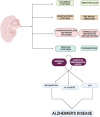New insight on the potential detrimental effect of metabolic syndrome on the Alzheimer disease neuropathology: Mechanistic role
- PMID: 39644152
- PMCID: PMC11624485
- DOI: 10.1111/jcmm.70118
New insight on the potential detrimental effect of metabolic syndrome on the Alzheimer disease neuropathology: Mechanistic role
Abstract
The metabolic syndrome or syndrome X is a clustering of different components counting insulin resistance (IR), glucose intolerance, visceral obesity, hypertension and dyslipidemia. It has been shown that IR and dysregulation of insulin signalling play a critical role in the development of metabolic syndrome by initiating the pathophysiology of metabolic syndrome through induction of glucolipotoxicity, impairment of glucose disposal and triggering of pro-inflammatory response. Furthermore, metabolic syndrome unfavourably affects the cognitive function and the development of different neurodegenerative diseases such as Alzheimer disease (AD) by inducing oxidative stress, neuroinflammation and brain IR. These changes together with brain IR impair cerebrovascular reactivity leading to cognitive impairment. In addition, metabolic syndrome increases the risk for the development of AD. However, the central mechanisms by which metabolic syndrome amplify AD risk are not completely elucidated. Consequently, this narrative review aims to revise from published articles the association between metabolic syndrome and AD regarding cellular and subcellular pathways. In conclusion, metabolic syndrome is regarded as a potential risk factor for the induction of AD neuropathology by different signalling pathways such as initiation of brain IR, activation of inflammatory signalling pathways and neuroinflammation.
Keywords: Alzheimer disease; metabolic syndrome; neuroinflammation.
© 2024 The Author(s). Journal of Cellular and Molecular Medicine published by Foundation for Cellular and Molecular Medicine and John Wiley & Sons Ltd.
Conflict of interest statement
The authors declare no competing interests.
Figures





References
-
- Kemp HG. Left ventricular function in patients with the anginal syndrome and normal coronary arteriograms. Am J Cardiol. 1973;32(375):376. - PubMed
-
- Wąsiewicz E, Kuźniar A, Szawica D, et al. Diabetic foot‐treatment and prevention‐literature review. J Educ Health Sport. 2023;38(1):129‐133.
-
- Kylin E. Hypertension‐hyperglycemia‐hyperuricemia syndrome. Zentralblatt Fur InnereMedizin. 1923;44:105‐127.
Publication types
MeSH terms
Grants and funding
LinkOut - more resources
Full Text Sources
Medical

